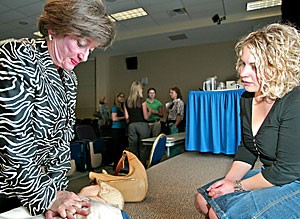Stop smoking and binge drinking and put down that energy drink if you want to avoid heart problems, two UA doctors said yesterday.
Heart problems, such as heart attacks and strokes, are increasingly common in younger generations, said Dr. Gordon Ewy, director of the UA Sarver Heart Center.
Ewy and Dr. Peter Ott, an assistant professor of medicine, spoke at the Paul Baltes heart health lecture about heart problems and prevention in Gallagher Theater.
“”This generation is probably the last generation that is going to live longer than their parents,”” Ewy said.
There is a diabetes epidemic that has been sparked by widespread obesity, Ewy said. Diabetes is one of the largest contributors to heart problems.
Children and college students’ lifestyles are creating an ever more unhealthy population, Ott said.
“”Binge drinking is something that mostly college students do,”” Ott said. “”This drinking can develop (an) abnormal heart condition called atrioventricular fibrillation.””
Typically on Sunday nights or Monday mornings, kids who overdo it over the weekend come back with “”A-Fib,”” also known as holiday heart syndrome, characterized by an irregular heartbeat, Ott said.
“”We usually convert them back to normal in about 24 hours,”” Ott said. “”We send them off with a, ‘Hey, by the way, you may want to cut back on your drinking,’ but you can’t really make someone stop drinking.””
Chronic drinking, “”which is like three, four, five high-balls every evening for like a decade,”” is so damaging to the heart that drinkers many end up awaiting heart transplants as a result, Ott said.
But alcohol is not the only drink poisoning young bodies and causing heart problems, Ewy said.
“”Avoid soft drinks, because they have eight teaspoons of sugar,”” Ewy said. “”If your child ran up to you and asked for eight spoons of sugar you’d say ‘no,’ but yet many would give them soft drinks in a heartbeat.””
Soft drinks, alcohol and Red Bull-type energy boosters can stimulate irregular heartbeats, Ott said.
Heart problems can be hereditary and deep-rooted, Ewy said.
Cholesterol can cause plaque buildup in arteries, which can break off the artery walls, causing bleeding and possibly blood clots, Ewy said.
Ott mentioned Arizona women’s basketball player Shawtinice Polk, who died last year from cardiac arrest caused by a blood clot in her lungs. Ewy said it’s difficult to hear about young people dying.
“”Some of the saddest things we see is younger people overlooking serious health issues,”” Ewy said.
People who aren’t predisposed to hereditary heart problems can avoid them by living a healthy lifestyle, Ewy said.
People with the highest rate of heart attacks and strokes are smokers, diabetics, the obese and those with other contributing heart problems, Ewy said.
“”When you stop smoking, your risk of a heart attack drops like a rock,”” Ewy said. “”It’s never too soon or too late to stop.””
“”In Arizona in 2002, 11,000 folks died due to sudden cardiac death,”” Ott said. “”Spread the word. What you see and learn here, take it home to friends and family.””
This lecture comes three years after Paul Baltes, former director of engineering professional development and the College of Engineering, died of sudden cardiac arrest, said Daniel Stolte, director of communications and public education in the Arizona Health Sciences Center.
“”He was very healthy, very athletic, and he worked out a lot,”” Stolte said.
Baltes suddenly collapsed and died while vacationing in Santa Fe, N.M., astounding those who knew him, Stolte said.
“”After he died, his friends and colleagues donated gifts and wanted to make a difference,”” Stolte said. “”They had to learn the hard way. Now they want to spread the understanding of how you can take care of your heart.””
Second-year medical students Megan Meislin, Joy Bulger and Laura Mercer joined the doctors after the lecture to teach a new type of CPR known as Constant Chest Compressions, or CCC.
“”Eighteen metropolitan cities have converted to Constant Chest Compressions,”” Bulger said.
“”There is not mouth-to-mouth in the new method,”” Meislin said. “”A lot of people were scared of germs and HIV from people they don’t know. People avoided CPR because of this.””
When the mouth-to-mouth method was used, the time between chest compressions was too long because of the breaths, Meislin said.
Most people don’t know how much pressure to give and they get nervous, so the new method is much simpler, Bulger said.
By just focusing on chest compressions, CCC is more effective than the old CPR method, Mercer said.
The women demonstrated the new method on dummies and allowed participants to try CCC first-hand.









